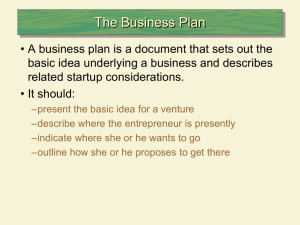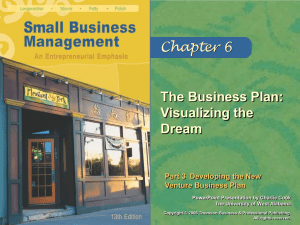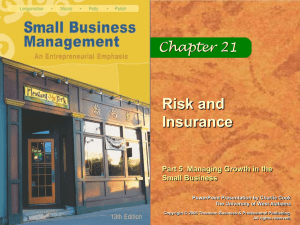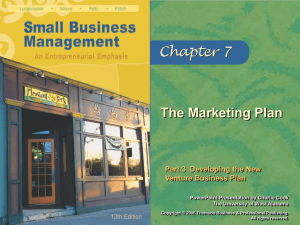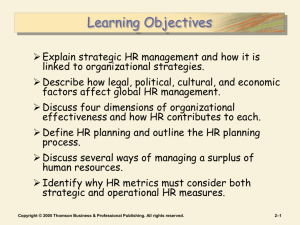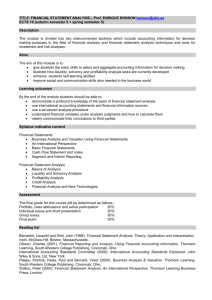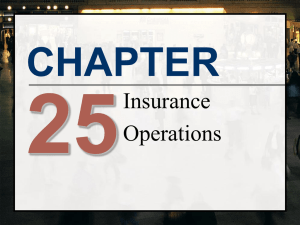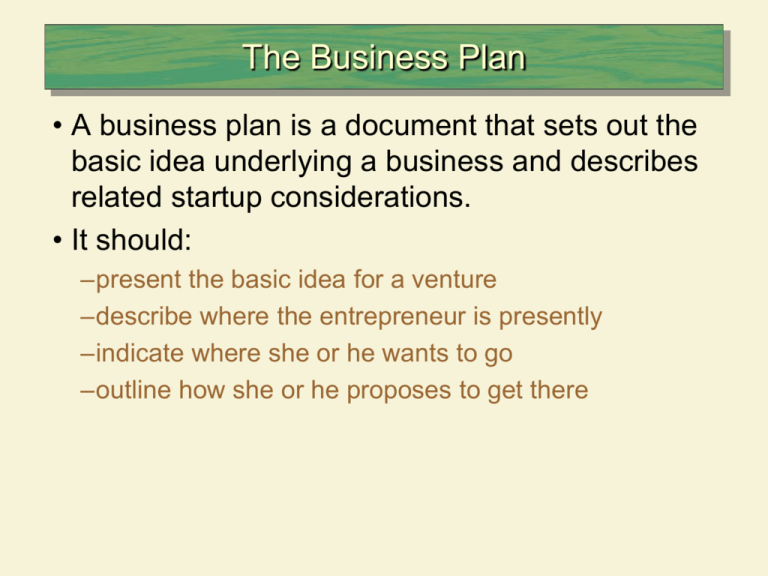
The Business Plan
• A business plan is a document that sets out the
basic idea underlying a business and describes
related startup considerations.
• It should:
–present the basic idea for a venture
–describe where the entrepreneur is presently
–indicate where she or he wants to go
–outline how she or he proposes to get there
The Business Plan (cont’d.)
• A business plan has three basic objectives:
–to identify the nature and the context of a business
opportunity
–to present the approach the entrepreneur plans to
take to exploit the opportunity
–to recognize factors that will determine whether the
venture will be successful
The Business Plan (cont’d.)
• A business plan may be of secondary
importance if the environment is turbulent or if
timing is such that the company needs to start
operations as quickly as possible rather than
slow down to write a business plan.
• The summary plan is a short form of a business
plan that presents only the most important
issues and projections for the business. This
may be ideal if the entrepreneur is short on time
or is facing a great deal of uncertainty about the
future of the company.
The Business Plan (cont’d.)
• A comprehensive plan is beneficial when:
–(1) describing a new opportunity (startup)
–(2) facing significant change in the business or the
external environment (changing demographics, new
legislation, or developing industry trends)
–(3) explaining complex business situations
Purposes of the Business Plan
• The business plan can serve as an effective
selling tool with prospective customers,
suppliers, and investors.
–In seeking financing, an entrepreneur must first use
the business plan to create interest in the startup and
then follow up with a formal offering memorandum to
those investors who seem genuinely interested.
• When writing the business plan, remember that:
–(1) investors have a short attention span
–(2) certain features appeal to investors, while others
are distinctly unappealing
Writing the Business Plan
• To maximize the effectiveness of a business
plan, write clearly and provide factual support for
any claims made.
• The entrepreneurial team, the opportunity, the
resources, the deal structure, and the “big
picture” are all interdependent factors that
should be given consideration when thinking
about the content of a business plan.
Writing the Business Plan (cont’d.)
• Key sections of a business plan are:
– (1) title page
– (7) marketing plan
– (2) table of contents
– (8) management plan
– (3) executive summary
– (9) operating plan
– (4) vision and mission statement
– (10) financial plan
– (5) company overview
– (11) appendix of supporting
documents
– (6) products and/or services plan
Writing the Business Plan (cont’d.)
• Common mistakes often made by entrepreneurs
when preparing a business plan include:
–(1) failing to provide solid data
–(2) failing to describe the product in lay terms
–(3) failing to thoroughly analyze the market
–(4) including financial statements that are overly
detailed or incomplete
–(5) hiding weaknesses
–(6) overlooking the fatal flaw
–(7) using bad grammar
–(8) making the plan overly long
Assistance with Business Plans
• A variety of books, Web sites, and computer
software packages are available to assist in the
preparation of a business plan.
• Professionals with planning expertise, such as
attorneys, accountants, and marketing
specialists, can provide useful suggestions and
assistance in the preparation of a business plan.
• The Small Business Administration (SBA), the
Service Corps of Retired Executives (SCORE),
and the FastTrac Entrepreneurial Training
Program can also be helpful.
Beyond the Business Plan (cont’d.)
• Despite the potential benefits of a well-drafted
plan, good judgment should be used in deciding
how much to plan in view of the specific
circumstances.
• The business plan, no matter how beneficial, is
not the business. A good business plan leads to
a successful company only when it is effectively
executed by the entrepreneur and the
management team.
Beyond the Business Plan (cont’d.)
• A business plan can be viewed as an
opportunity for the entrepreneur and the
management team to think about the potential
key drivers of a venture’s success or failure.
Organization for help with Business Plans
When writing a business plan, you can get help
from the following :
• Small Business Administration (SBA) – is an
independent agency of the federal government
that was created to help Americans start, build,
and grow businesses. SBA also provides aid,
counsel, and assistance to protect the interests
of small business concerns, to preserve free
competitive enterprise, and to maintain and
strengthen the overall economy of our nation.
• Small Business Development Centers (SBDC) – provides
management assistance to current and prospective small business
owners. Counselors from the SBDC provide free one-on-one
assistance in developing a business plan. They also provide
inexpensive workshops on tropics that may help you develop your
plan.
• SBDC have many resources in one place to assist individuals and
small businesses. SBDCs were formed as a cooperative effort of the
private sector, the educational community, and federal, state, and
local governments. SBDC is available to anyone who cannot afford
the services of a private consultant and who is interested in
beginning a small business for the first time or improving or
expanding an existing small business.
• Service Corps of Retired Executives (SCORE) – is made up of
over 10,500 retired executives who volunteer their time to provide
entrepreneurs with real-world advice and know-how. They provide
free confidential advice that could be helpful to you as you prepare
your business plan. They set up meetings face-to-face or work over
the internet with you.
• Chamber of Commerce – Can provide information on local
resources, zoning, and licensing as well as trends affecting local
business
• Trade Associations – Organizations made up of professionals in a
specific industry are called trade associations. They provide
information, education, and networking opportunities for individuals
in their industry. These association can be valuable sources of
information to entrepreneurs.
• Professional Consultants –some entrepreneurs
hire experts to help them. Professional business
consultants can be found in directories available
in your library or on the Internet.
• Financial Institutions – When writing the
financial section of your business plan, it may be
helpful to talk with a banker and an accountant.
They can help answer your questions about
loans and financial statements.
Executive Summary
• Is a brief recounting of the key points contained
in a business plan. Investors and lenders may
read many business plans every day.
• If the executive summary creates excitement for
the concept, they’ll go ahead and read the entire
plan. Should be no longer than 2 pages. Include
the most important information from each
section of the plan.
• Persuade the reader that this business is going
to be a success.
Copyright © 2006 Thomson Business & Professional Publishing. All rights reserved.
Student 6–16
Product/Service Plan
• Present the product or service you’re offering.
• The nature of your business should be clear to
the reader.
• Important to note the unique features of the
product/service and any possible spin-offs.
• Spin-offs are additional products or services that
you might do later when the business is more
established.
Copyright © 2006 Thomson Business & Professional Publishing. All rights reserved.
Student 6–17
Management Team Plan
• Present your qualification and those of any
partners you’ll have.
• Analyze the expertise you’re missing and how
you will solve that problem.
• Describe the advisory board that will help you
get started.
Copyright © 2006 Thomson Business & Professional Publishing. All rights reserved.
Student 6–18
Industry/Market Analysis
• Presents your research into the industry and
market.
• Analyze your customers, competition, and
industry.
• Contain information about prospective location’s
geographic, economic, and demographid data.
Copyright © 2006 Thomson Business & Professional Publishing. All rights reserved.
Student 6–19
Operational Plan
• Includes all the processes that take place in the
business so that the product or service is produced
and delivered to the customer.
• Manufacturing a product you’ll want to discuss the
status of your product development.
• Distribution channel – means for supplying the
product to the customer. Either direct or indirect.
• Direct channel – delivering the service directly to the
customer.
• Indirect channel – through a wholesaler or retail
stores .
Copyright © 2006 Thomson Business & Professional Publishing. All rights reserved.
Student 6–20
Organizational Plan
• Looks at the people aspects of the business.
• Discusses such things as the management
philosophy, the legal form of the company, key
management personnel, and key employment
policies.
Copyright © 2006 Thomson Business & Professional Publishing. All rights reserved.
Student 6–21
Marketing Plan
• Involves how a company makes its customers
aware of its products or services.
• Includes such features as the market niche that
is being served, the pricing policy, the company
image, the marketing tactics used to reach the
customer, a media plan, and a marketing
budget.
Copyright © 2006 Thomson Business & Professional Publishing. All rights reserved.
Student 6–22
Financial Plan
• Presents the forecasts for the future of the
business.
• Explains the assumptions made when
calculating your forecast figures.
• This part of the business plan shows that the
new business will be financially healthy.
Copyright © 2006 Thomson Business & Professional Publishing. All rights reserved.
Student 6–23
Growth Plan
• Looks at how the business will expand in the
future.
• Investors and lenders like to know that a
business has the potential and the plans to grow
over its life.
Copyright © 2006 Thomson Business & Professional Publishing. All rights reserved.
Student 6–24
Key Terms
business plan
summary plan
comprehensive plan
prospectus
executive summary
mission statement
products and/or services plan
marketing plan
management plan
operating plan
financial plan
pro forma statements

